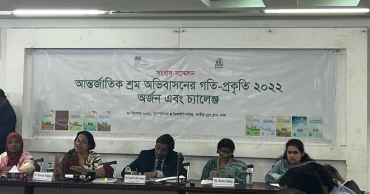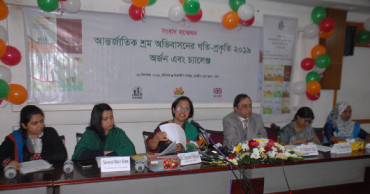RMMRU
2022 may show 3.17% fall in remittance receipts: RMMRU
The year 2022 may show a 3.17 percent drop in remittance inflow to Bangladesh compared to 2021, a Refugee and Migratory Movements Research Unit (RMMRU) report revealed Thursday said.
The migrant workers sent $19.58 billion home during January-November of 2022. If this trend continues, the remittance income will stand at $21.36 billion at the end of the year, it added.
The report also assumed that the country's overseas employment will rise by 81.88 percent this year. Bangladesh sent more than 1.0 million workers abroad in the first 11 months of this year.
Employment will stand at more than 1.1 million at the end of the year, it added.
The report "Labour Migration from Bangladesh 2022: Achievements and Challenges" was disclosed in Dhaka.
RMMRU Chair Professor Tasneem Siddiqui, who presented the report, said: "Declining growth in remittance inflow depends on various factors. Workers are heavily dependent on hundi due to low rates in banks."
"Also, workers usually cannot send remittances in the first year of their migration. Every year a significant number of workers are cheated while going abroad, and they do not get the right jobs. Moreover, many of them arrange money from home to return."
The RMMRU chair suggested ensuring safe migration and increasing incentives for the workers to encourage them to send money through official channels.
"The incentive should be 10 percent for the remitters," she said. "If the apparel makers receive attractive cash incentive support, then why not migrant workers?"
The report showed that the skilled worker migration decreased in 2022 compared to the previous year. As of December 21, this year, of the total outbound workers, 17.76 percent were skilled workers; 21.33 percent of skilled workers went abroad in 2021.
Read more: Swift return of irregular migrants to help promote legal migration: European Commissioner
Among the outbound Bangladeshis, the number of professionals is lower. However, it slightly increased compared to last year.
As of December 21, this year about 0.33 percent of professionals out of the total migrants went abroad with jobs. The number of professionals was 0.14 percent in 2021, the report said.
Some 99,684 women went abroad with jobs during January-November this year.
If the trend of outflow continues, the migration of women will increase by nearly 35 percent in 2022 compared to the previous year, the report said.
Quoting the US-based Trafficking in Persons report 2022, RMMRU said while the migration cost has decreased slightly, it is still the highest in South Asia for Bangladeshi migrants.
It also said although the opening of the Malaysian market was a major development in the outgoing year, workers are still suffering from unethical migration costs. "A section of recruiters continue this unethical practice."
Read more: US Asst Secretary Noyes in Bangladesh to discuss refugee, migration issues
3 years ago
'Internal migrants need same policy attention as international migrants'
The internal migrants now need to have the same policy attention as international migrants, said Dr Hossain Zillur Rahman, former adviser to the caretaker government, Wednesday.
Before the pandemic expenditure growth was very strong across all household groups. The share of food in the expenditure bundle was decreasing, while the share of non-food items was increasing rapidly. These trends reversed during the pandemic, Dr C Rashaad Shabab, senior lecturer at the Department of Economics, the University of Sussex Business School, said.
However, internal migrant households were best able to protect expenditure from adverse shocks. The expenditure of non-migrant households was the worst affected by adverse shocks during this period, he added.
By 2020, the poverty rate among internal migrant households is very similar to non-migrant households. Thus migration has reduced inequality through social mobility.
"Migration, especially internal migration, appears to enable households to protect expenditure against shortfalls and to prevent them from falling into poverty. It enhances social mobility and so is an important tool to reduce inequalities," Rashaad said.
"Compared to 2017, the volume of remittance fell by 8 percent per household in nominal terms in 2020. When 5 percent inflation per year is added then the reduction in remittance in real terms is at 23 percent," said Refugee and Migratory Movements Research Unit Chairperson Professor Tasneem Siddiqui.
The amount of remittances sent by female migrants increased by 16 percent in nominal terms, in real terms it reduced by 1.6 percent.
Female internal and international migrants come from more disadvantaged backgrounds. They are more likely to be widowed and divorced and more likely to have lower levels of education, said Professor Tasneem.
The experts were addressing the workshop "Impact of Migration on Transformation to Sustainability: Poverty and Development in Bangladesh" at a Dhaka hotel Wednesday.
RMMRU presented the findings of a long-running panel survey of over 6,000 households, spanning 20 districts of Bangladesh, at the event.
Md Shahidul Haque, former foreign secretary, commended the research for bringing internal migration so strongly to the policy arena for the first time.
The research compared the economic sustainability of internal migrant, international migrant and non-migrant households. It found that among these groups internal migrant households are best able to protect expenditure against adverse climate and health shocks.
4 years ago
Ensure 2pc loan interest rate for migrants: RMMRU
Refugee and Migratory Movements Research Unit (RMMRU) on Tuesday urged the government to set a 2 percent loan interest rate for migrants affected by COVID-19 pandemic.
5 years ago
Covid-19 pushed Rohingyas towards hunger, malnutrition: Experts
Experts at an e-symposium on Thursday said the lockdowns and economic slowdown for Covid-19 pandemic in different countries have robbed Rohingya refugee communities further of their livelihood opportunities and pushed them into hunger and malnutrition.
5 years ago
Seek collective negotiation to save migrant workers: Experts
Speakers on Wednesday urged the countries of origin to collectively negotiate with the countries of destination to stop any forced return of migrants noting that the global migration regime obliges destination countries to look after the migrants although currently they are being subjected to forced return.
5 years ago
Export skilled manpower to reduce vulnerabilities: Experts
Speakers at a webinar in the capital on Monday stressed the importance of exporting skilled manpower, aiming to reduce their vulnerabilities in their host countries as many have been arbitrarily repatriated amid the Covid-19 pandemic recently.
5 years ago
Protect migrant workers, families: RMMRU to govt
To cope with the impact of coronavirus pandemic, the Refugee and Migratory Movement Research Unit (RMMRU) on Saturday placed a set of recommendations, including formation of a fund for the families of Bangladeshi migrant workers having no earnings.
“It’s commendable that the government announced a fund of Tk 5,000 crore to pay wages of the workers employed in export-oriented industries. So, we’re demanding to form a fund similarly to provide loan without interest and donation in some cases to the families of the Bangladeshi migrants who remain workless abroad,” said RMMRU founding chair Dr Tasneem Siddiqui at an online press conference.
The RMMRU of the Dhaka University (DU), a centre for research and grassroots action, arranged the press conference to place a number of recommendations for the protection of the Bangladeshi migrants during the COVID-19 outbreak.
It also recommended ensuring protection of Bangladeshi migrants in different countries by conducting free COVID-19 tests and providing food assistance through the Bangladesh missions stationed abroad.
In this regard, Dr Siddiqui, also DU political science professor, said several Middle East countries, including Saudi Arabia have announced that all immigrants – both regular and irregular — will be given healthcare services free of cost.
But the countries that have yet to come up with free COVID-19 testing and treatment for immigrant workers should be urged to provide such facilities immediately, she added.
“It’ll have to convince the countries that drawing difference between their citizens and immigrants during this crisis will in fact endanger the public health security of the countries,” said the RMMRU founding chair.
Noting that Bangladeshi embassies in foreign lands are making efforts to render services to the migrants with their limited resources, she said the missions informed the government about miseries of the migrants and requested to provide food assistance to them.
“The Expatriates’ Welfare and Overseas Employment Ministry has taken some measures in this regard. RMMRU is demanding immediate allocation from the government fund to implement these measures,” she said.
In many cases, many migrant workers live in unhygienic conditions in cramped places. It is not possible to maintain safe distance to prevent the infection of this virus, she said adding that the Bangladeshi missions should inform the migrant workers how they can take cautionary measures in this regard.
The other urgent recommendations placed by RMMRU include promoting positive attitude towards migrants, providing food aid to migrants’ families in need, preparation of a database on migrants returned by the Expatriates’ Welfare Ministry, making call to different countries to keep the organisations concerned with remittance process operational so that Bangladeshi migrants can send money to their families, considering the issue of increasing incentive to remittance inflow following the coronavirus crisis, and utilising the experiences of the expatriates, recently returned home from Italy and other countries, regarding preventive measures in case of the coronavirus pandemic in the country.
The RMMRU also placed a number of long-term recommendations including utilising skills of Bangladeshi migrants who returned home, and opening BSc nursing course in all public and private universities, introducing lab technician courses and other medical related courses in Technical Vocational Education Training Centres and Technical Training Centres as there would be huge demand of the skilled persons in the health sector during the post-coronavirus period.
5 years ago
Labour migration sees fall by 10 pc in 2019: Report
Despite increased inflow of remittance in 2019, labour migration from Bangladesh has declined by about 10 percent compared to the previous year, says a new study.
6 years ago

.jpg)

.jpg)

.jpg)
.jpg)




